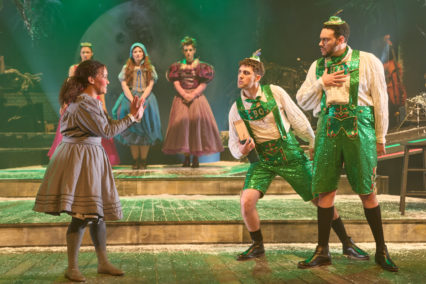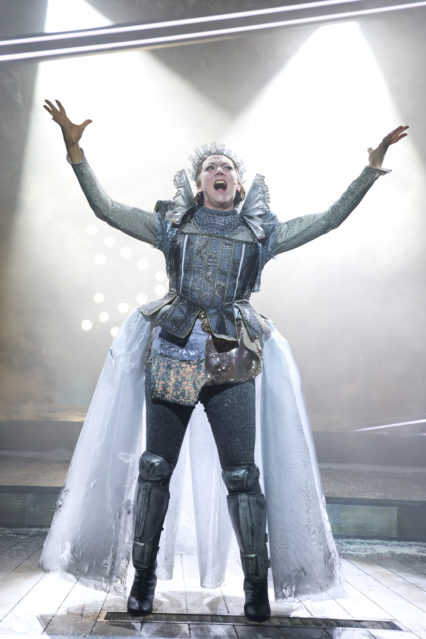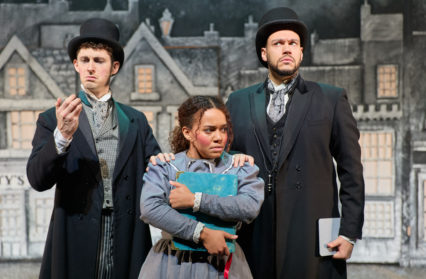With the Christmas theatre season underway, Michelle Deininger enjoys Hannah McPake’s reimagining of The Tales of the Brothers Grimm at The Sherman Theatre.
Audiences looking for a pre-Christmas treat should look no further than Tales of the Brothers Grimm. Featuring a clever set design, sharp choreography, and catchy songs, the production plays with the idea of what we know about stories and how stories shape who we might become. Set in Cardiff, on Christmas Eve in 1913, the narrative features central character, Stevie (played by Lily Beau), who wishes for her own happy ever after and, more importantly, a story of her own. Stevie’s Mum, played by the show’s writer Hannah McPake, has always forbidden Stevie from reading stories like those of the Brothers Grimm. Instead of celebrating as a family on Christmas Eve, Stevie’s Mum is out blowing up post boxes as part of the suffragette campaign for votes for women, leaving Stevie with her uncles. A storm transports Stevie to the Grimmdom, where stories are falling out of their narrative arcs and the Snow Queen (who has crossed over from Hans Christian Andersen’s stories) threatens to destroy everything. There are strong echoes of The Wizard of Oz as well as many intertextual references to other fairy tales, including Andersen’s.
The set design captures the essence of what Tales of the Brothers Grimm is all about – breaking out of frames and reshaping stories. A physical copy of the fairy tales is on stage from the very first scene and the embossed pattern on the front cover is mirrored in the frame that surrounds the entire stage. After the storm, and the cityscape of Cardiff is raised, a set of skewed frames in the same design as the book cover is revealed. Characters literally walk out of their plot lines, through one frame into another. We meet first Cinderella (Katie Elin-Salt), then Sleeping Beauty (Bethzienna Williams), and finally Rapunzel (Sarah Workman), who are all propelled out of their respective plotlines by Stevie. Cinderella’s glass slipper, Sleeping Beauty’s slumbers, and Rapunzel’s hair do not follow the storyline they are supposed to and all must be put back right. When the Brothers Grimm are mentioned, characters burst into a collective cry, complete with forced grins, of “Thanks to the Brothers, life here is perfect and everyone is happy!” as a tongue-in-cheek reminder of the constriction imposed by patriarchal narratives. The narrative continually asks questions about predefined roles, paternalist constructs and the impact of patriarchal values on the lives of women and girls.
Aside from Stevie and the Narrator (Keiron Self), all the other characters play at least two, if not three roles, emphasising the ways in which the production plays with archetypes. Kyle Lima provides a superb, blues-inspired Wolf while also playing Stevie’s Uncle Will and Wilhelm Grimm. Similarly, James Ifan is a comically underwhelming Prince Charming as well as Uncle Jack and Jacob Grimm. There are also several scenes where McPake, in either Snow Queen or Mum roles, is arguing her case against the narratives set by the Brothers Grimm, having already subverted, in a satisfyingly metatextual manner, these stories herself as the writer. The one area where audiences might question the scope of the

production’s narrative power, especially if they include boys of the ten-year-old variety, as did our party, is what it offers in terms of role models for boys. Prince Charming’s story is one of reverting back to his earlier state (which I won’t reveal for fear of spoilers) rather than finding a new or different way of existing. In comparison, all the female characters uncover self-knowledge, and all undergo various forms of transformation. Audiences should look out for the clever costume alterations that come in the midst of the show, where one character transforms from passive princess to something closer to Wonder Woman, all in a spectacular shade of hot pink. The women in the production find sisterhood, friendship, and community, as well as their own sense of self, independent from the paternalist, patriarchal stories that have held them in place for so long. Prince Charming is also shaped by those stories but is unable to break free in the same way.
While this is a Christmas show, there are political elements to the production that draw a sharp line of connection between the setting of 1913 and now, with Stevie’s Mum taking direct action to achieve votes for women. The production is very clear that if we want to change our stories, we have to fight to do so. In recent months, many media commentators have been making parallels between suffragette campaigns and climate protests, not least the direct action undertaken by protest group Just Stop Oil. While the parallels in this production are not drawn any further, they are clearly there as a reminder that the fight for justice, in whatever form it might take in the contemporary moment, continues. On a broader political note, in terms of access to the arts and the current cost of living crisis, the Sherman Theatre should be commended for its inclusive approach to ticket prices, including half price tickets for children and under 25s, reasonably priced family packages, and the option to pay in two instalments. It really feels that everyone is welcome and belongs in this space, from the moment of booking tickets to being ushered to a seat.

Younger viewers are very well catered for in this production, even before the curtain rises, with colouring, a wordsearch and spot-the-difference activities included in the middle of the programme. While there was no colouring attempted in our group, Spot the Difference and the Wordsearch were completed with little complaint. The myriad of memorable and rousing musical numbers, borrowing intentionally from many pop songs (the Brothers Grimm in Backstreet Boys mode is an especial highlight), had smaller children dancing in the aisles and adults nodding knowingly at the connections (and their own back catalogues of terrible yet catchy chart music). Characters would often pick up musical or percussion instruments on stage, sometimes in the style of a music video, with Rapunzel giving an especially dazzling performance on the drums. This added to the sense of set roles being transgressed but was also incredibly fun to watch.
Attending with a child who has reached the pre-teen “everything is boring” stage a little earlier than anticipated, I admit I was somewhat apprehensive that a story about fairy tales might not be well received, especially with the focus on female characters. At school, Jack and the Beanstalk has been the curriculum’s fairy tale of choice for about four consecutive years, to the point that it’s become a family in-joke that there are no other stories in the world to tell. There were some grimaces pulled at the idea of a whole evening of fairy tales, but enough childhood wonder left to avoid direct refusal. I knew the experience was not going to be entirely painful when I saw a small smirk during an early scene where the narrator lies on the stage breathless from repeating himself, a scene any parent will find highly familiar. The narrator, I discovered, was one of the highlights for our younger viewer – described as “funny” even, at one point. Later, there were several bouts of spontaneous clapping. I’ll take that as a successful night out.
If you have the chance to go to Tales of the Brothers Grimm I doubt you’ll be disappointed, whether you’ve got children in tow or not. As a fast-paced, well-acted, and comic production with some depth to it, and enough Christmas spirit to cheer even the grumpiest of Scrooges, it really is an enjoyable evening out.
Tales of the Brothers Grim plays at The Sherman Theatre in Cardiff until 31st December. Tickets are available here.











